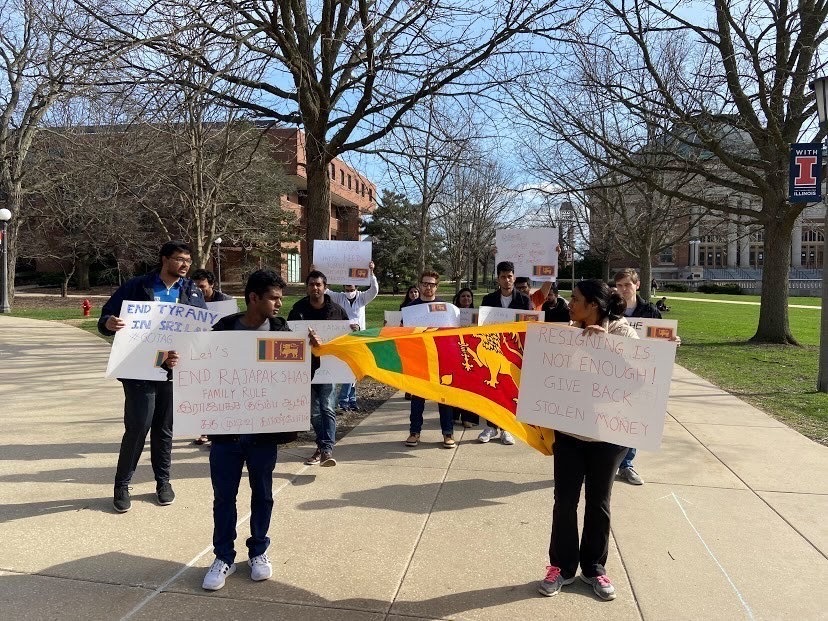UI students protest for Sri Lankan reforms
Photo courtesy of Anjana Samarakoon
Protestors walk along the Main Quad in protest for Sri Lanka on April 3. Protestors on the Main Quad call for the resignation of the president of Sri Lanka Gotabaya Rajapaksa while also showing support for the people within Sri Lanka.
April 25, 2022
In the afternoon of April 3, around 20-30 members of the Sri Lankan community on campus gathered on the Main Quad to protest the actions of the Sri Lankan government and to show solidarity with similar protests occurring in Sri Lanka and elsewhere.
“We decided as people — Sri Lankans who are in other countries — we should also protest to show solidarity with our fellow citizenry in Sri Lanka,” said Anjana Samarakoon, graduate student studying electrical and computer engineering and one of the protest organizers.
Organized on the same day, it took a couple of hours for Samarakoon to gather and notify potential participants.
Samith Sirimanna, graduate student studying computer and electrical engineering who helped organize the protest with Samarakoon, said the Sri Lankan “community here is very close,” which allowed them to quickly reach out to potential participants and organize the protest.
“We have around maybe 15 grad students from Sri Lanka who are very close to Sri Lanka … and a few undergrads,” Sirimanna said.
Get The Daily Illini in your inbox!
The protest coincides with demonstrations in Sri Lanka calling for the resignation of the country’s current president Gotabaya Rajapaksa.
“In parallel to those protests in Sri Lanka, we wanted to show support and solidarity with our people,” Sirimanna said. “The community here is very close, and it’s very small also.”
According to Sirimanna, the COVID-19 pandemic worsened the already unstable economy in Sri Lanka, leading to shortages. In 2021, the Sri Lanka government declared an economic crisis, and in August 2021, the government also declared a food emergency.
“These are the main two reasons that Sri Lankans started having economic issues,” Sirimanna said. “They did not have fuel, so they could not fill up their vehicles and move around. And the other thing is they did not have local food to buy because there was a food shortage.”
Moreover, Sirimanna blamed the Sri Lankan government, specifically its current president, Rajapaksa, for “corrupt governance,” which led to “a level that inflation was increasing over the roof.”
“His family basically has been running the country since like 15 years now,” Sirimanna said. “It started with the civil war in Sri Lanka, and these people came to power. They ended the civil war, but then they started this corrupted governance.”
As the protests intensified, Sri Lanka imposed a weekend curfew and tried to take down social media posts regarding the protests. Sri Lanka also introduced an emergency law that allowed citizens to be arrested without a warrant or a reason, according to Samarakoon.
This came to head on April 3, when Sri Lankans organized a series of protests in Sri Lanka over social media.
“On April 3, people in Sri Lanka organized a huge protest in Sri Lanka in every city,” Samarakoon said. “This was not organized by a political party. They themselves, through social media, started talking independently. This is an independent protest, not against a political party.”
The Sri Lankan community in the U.S. tried to participate in the protest movement on April 3 as well, organizing events on social media like the one held on the Main Quad, according to Samarakoon.
Samarakoon and his friends made a WhatsApp group chat as they individually contacted potential participants.
“We made a WhatsApp group, and we asked them to come, and everyone came,” Samarakoon said. “Sri Lankans wanted to come. But when it comes to my department, I did not specifically ask. I just told them we are doing something and then they came just to show support.”







